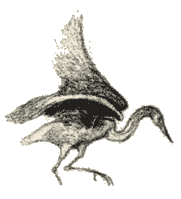This Month's Story
DEATH OF A GREBE
I’ve mentioned many times the beauty of the Mississippi Sound in the early morning hours. The view I saw as I sat down for breakfast this morning was no exception.
An atmospheric high had entered the area yesterday and much of the heat of the earth around us had radiated away through the clear night skies so that this morning’s temperature was a low 41° in comparison to yesterday’s low of 71°. The waters of the Sound at 60° were far warmer than the air above and they steamed as if the Sound was a vast tub of warm water in a cold room. Wispy tendrils of this steam rose everywhere from the water surface and the sun, breaking through the morning mist, colored the steam a pale silver.
An early pelican, dropping hard into the water, sent up a bright white splash to compliment the rising pale wisps. He took off immediately, having missed, I suppose, his attempt at breakfast.
All of this presents a broad scene of seeming tranquility. A scene that is typical of the beauty of the Sound that Stella and I have witnessed over the years we’ve lived here.
But in truth, it is a deceptive tranquility.
Epitomized by the foraging efforts of the diving pelican, the serenity of the scene cloaks what is really an endless basic struggle that takes place in nature, a struggle of organisms living off other organisms. It is an unremitting struggle of organisms striving to continue their own existence, to reproduce and eventually, in turn, to die. All our lives we see this eternal struggle all about us and become jaded and ignore it. But it is there.
I re-experienced this basic rule of nature several years ago when Stella and I took a walk on the beach. As we walked we saw a short distance ahead of us an injured grebe being attacked by crows. I chased the crows away and then turned to help the grebe. The bird, seeing me as just another predator, hurried into the water. I followed. Now, seeking further escape, it dove below the surface and swam away.
I could briefly see its fleeing form in the shallow water and continued to follow it. The water was fairly clear that day and I was able to wade after the bird quite easily. The grebe surfaced and, seeing that I was only yards away, desperately dove again. Only this time its stay under water was less. This happened twice more. Each time its stay underwater was shorter. My only excuse for my actions is that I thought the bird was tiring and that I would soon be able to somehow pick it up and get it to someone who could help it.
I was wrong. The bird surfaced one more time about twenty feet away from me and again, seeing my presence, dove. I decided not to follow but to wait and see where it came up. Nothing happened. Nothing. I felt a cold tightening in my chest. I watched and waited, nothing. Above me the crows wheeled, scolding. I stood in the hip-deep water looking about and waiting fruitlessly until even the crows left.
Frustrated, I returned to the beach where Stella stood waiting. She gave me a sympathetic squeeze and, cutting our walk short, we headed back down the beach to the house.
It was just another bird. I realize that what happened, happens a million times each hour, each day and has been happening for centuries and will continue to happen for centuries more. Even the noisy crows were just looking for a meal and, for all my goody-goodyness, I will probably feast on a chicken breast or wing tomorrow.
Perhaps when viewed in a broad perspective all of this doesn’t matter and really is helpful to the general gain. Perhaps these small tragedies when viewed statistically are merely outliers or are the inevitable roughening of the statistical curve that helps preserve the species.
Darwin and all seasoned naturalists have long ago realized this inevitability and learned to impassively view it all as such. I know that I should view it all with the same understanding eye, knowing what I see is necessary and there is nothing I can do to change it.
But it’s not easy.
